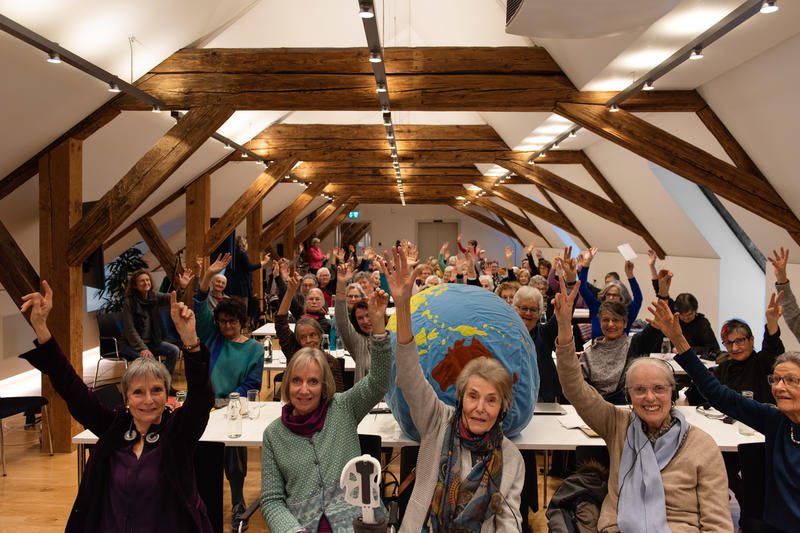Luxembourg, 27th June 2022 – The Swiss association of “KlimaSeniorinnen”, a group of more than 2000 women with an average age of 73, are currently travelling through Europe to explain the background of their climate lawsuit against the Swiss government. During their stopover in Luxembourg, they explain why protection from the consequences of climate change is a human right that all members of society, but especially senior citizens, can and should demand from their government.
It is now well known that climate change is not only harmful to the environment and biodiversity, but also to human health. Heat waves are occurring more and more frequently as a result of global warming and often have very serious health implications, especially for older people, as studies by the World Health Organisation (WHO) have shown. [1]

But authorities in charge have generally been remiss when it comes to limiting global warming to a level that poses no risk to people’s health. In 2016, around 150 Swiss women had had enough of their government’s inaction and founded the “KlimaSeniorinnen” to take legal action. The accusation: the Swiss government was not doing enough to protect them from the consequences of the climate crisis.
“Global warming makes people sick”, says Rosmarie Wydler-Wälti, Co-President of the association. “We older people are especially affected: Because of more frequent and more intense heat waves, the risks for us to become ill or die early are increasing excessively.”

After appealing to the Swiss government, the climate activists turned to the Swiss Federal Administrative Court, then to the Federal Supreme Court. Each time they met with rejection. In autumn 2020, the women resorted to the European Court of Human Rights (ECHR) in Strasbourg. Numerous renowned supporters filed third-party interventions with the ECtHR – including the UN High Commissioner for Human Rights Michelle Bachelet, two UN Special Rapporteurs, a UN independent expert and the European Network of National Human Rights Institutions (ENNHRI).
“We’ve been observing a strong increase in so-called climate change litigation for some years now”, says Myrna Koster, Climate Justice Campaigner at Greenpeace Luxembourg. “Cases such as the climate seniors’ lawsuit or the success of the Urgenda Foundation against the Dutch government in 2019 [2] show that legal recourse is a legitimate option for members of the civil society to claim their right to life and health.”
The ECtHR accepted the case in March 2021, giving it high priority. At the end of April, the case was even referred to the Grand Chamber, the highest instance of the ECtHR. The seniors expect the ECtHR to schedule a public hearing in the coming months..
Notes:
[1] With age, the human body encounters more and more difficulty in regulating its temperature. Older people sweat less and hardly feel thirsty. The result can be dehydration, heat cramps or a life-threatening heat stroke. (WHO Fact Sheet)
[2] At the end of 2019, the Dutch Supreme Court ruled that the state was obliged to reduce its greenhouse gas emissions in order to counteract climate change. Climate change poses a threat to human life, which is protected by human rights. Not taking sufficient action against climate change is therefore a violation of human rights.
